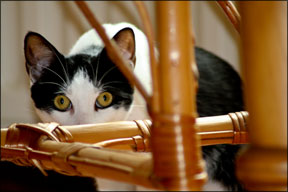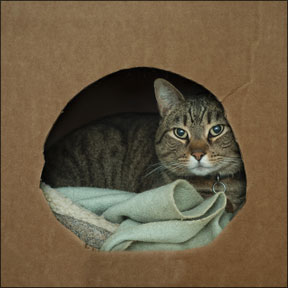Whenever cat owner Susan Lomond turns on her printer, her cat Sylvester dashes over to sit on it, lie on it and watch in fascination as the paper comes out. But when Susans friend Diana turns on her printer, her cat, Petra, flees in terror. 288 Cats respond differently to noise depending on their personalities and experiences – and even their genetics. When cats get scared of noise, we often feel the need to protect them. Heres what you can do to help your cat cope with noise. Scary Sounds. Cats differ from dogs when it comes to being frightened by noise. Dogs are notoriously afraid of thunder and fireworks, and will often try to escape from the house in a panic. Cats are more likely to be scared of unexpected noises around the house, such as the vacuum cleaner, construction work or a hair dryer. “But thunder and fireworks dont seem to bother cats,” says Katherine A. Houpt, VMD, PhD, the emeritus James Law Professor of Animal Behavior at Cornell Universitys College of Veterinary Medicine. “I have never seen fireworks or thunder phobia in cats,” she says. Genetics At Work. Experts believe that genetics plays a strong role with cats. “Some cats are genetically afraid of almost everything. These are the ones we call scaredy cats,” says Dr. Houpt. “They not only run from noises, but also from visitors.” While frightened dogs may try to run away, cats are more likely to retreat and find a place within the house to hide, such as in a closet, under the bed or high up on a kitchen cabinet. But not all noise is bad. Take Susans printer, for example. If your cat associates a noise with something pleasant, such as finding her favorite person at the printer, that noise will attract her. Probably the most common noise that is music to a cats ears is the sound of the electric can opener, which means something good may soon land in her dish. 288 How You Should React. When your cat gets scared of a noise, your first instinct may be to hold her and soothe her. “This is controversial among behaviorists,” explains Dr. Houpt. “I recommend not comforting your cat, because she may interpret this as a reason to really be afraid of the noise.” By the same token, never punish your cat for her fear, as this will only increase her anxiety. The best thing to do is let your cat run and hide in a place of her choosing. Let her stay there as long as she needs to. This is natural and what cats do in the wild when theyre scared of something. If your cat hides for a long time, “try luring him out with a treat or his favorite toy,” says Dr. Houpt. “But never drag a cat out of his hiding place – unless hes in some danger.” Another way to help your cat cope with scary noises is through the behavioral technique of desensitization. First, you need to recreate the noise – perhaps the vacuum cleaner – by taping it onto a CD. Start by playing the CD at a very low volume. Your cat will hear it, but he should not show signs of fear at this level. You should increase the volume very gradually until your cat is used to hearing the sound at a normal level. If he shows fear at any point, decrease the volume and proceed a little more slowly. This method should work if you combine it with a favorite reward for not hiding. While you play the CD, engage your cat in some of his favorite games. Of course, shower your kitty with affection and some treats when he accomplishes this feat. Remember, this technique will require both time and patience. Soothing Medicine. Sometimes cats become overly agitated by noise. In this situation, your veterinarian may suggest a product called Feliway. Available at your veterinarians office or from a pet supply shop, this product is synthesized from a naturally occurring feline phernome that appears to calm cats down. You can use it as a spray or diffuser when theres a lot of noise going on in your home, such as construction. “Your cat may just come out to eat and use the litter box, but thats okay,” explains Dr. Houpt.




